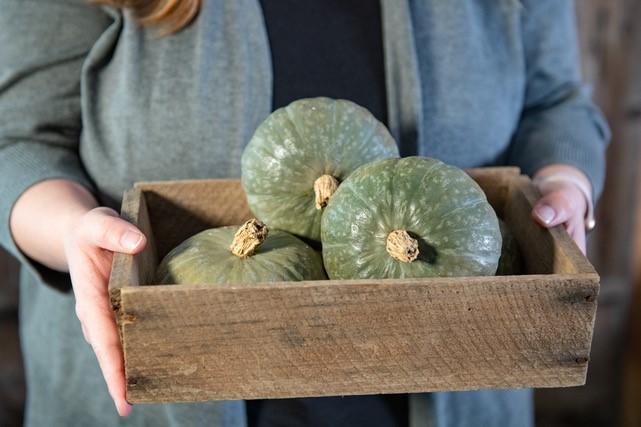Johnny’s Selected Seeds won its 13th All-America Selections award this year. It is the first such award for a plant bred by Lindsay Wyatt, who has been breeding vegetables for the Winslow company since 2015.
The winner is Sweet Jade, a kabocha squash that is just the right size to feed one or two people – depending on their appetite – with little waste. According to the catalog, it yields heavily and stores well.
Sweet Jade, like most new plants, has had a long process in coming to market and winning its AAS status.
To develop a new plant, plant breeders cross-breed many plants with the characteristics they hope to get in the new plant. Just as human children are not exact copies of their parents, these plants are unique, and the breeders never know exactly what the results will be. Wyatt was pleased with a brand-new hybrid she developed in 2017; she’d benefited from advice from Rob Johnston, Johnny’s founder, and Janika Eckert, both of whom had also worked on developing small squash. Promising genes from a squash they’d tested became parent lines for Wyatt’s new hybrid, which eventually was named Sweet Jade.
Wyatt tested Sweet Jade for several years, comparing it to several closely related plants she was also working on, plant cousins, you could call them. Sweet Jade hit the mark for flavor, color and size, and Johnny’s began the process of bringing the new hybrid to market. Wyatt said wasn’t surprised it won an award.
In 2018, when Johnny’s won two AAS prizes – for its cayenne pepper Red Ember and grape tomato Valentine – the winners were not his favorite entries that year. He preferred two summer squashes, Tempest and Zephyr. Does Wyatt have any creations she likes better than Sweet Jade? “That is like asking which of your children you like best,” she replied.
Other squashes that Wyatt has developed include Marmalade, which is similar to Sweet Jade but produces larger two-to-three-pound squashes (Sweet Jade squashes weigh between one and two pounds); an acorn squash called Night Shift; and a jack-o-lantern pumpkin called The Boss.
Each January, the staff at Johnny’s meets several times to establish breeding targets, with the goal of expanding the diversity of the employee-owned company’s products, Wyatt said. Her group has about 30 different products in development at any one time. Many are deemed inadequate and are discarded without ever being offered for sale.

Plant breeder Lindsay Wyatt with Sweet Jade, a new award-winning squash she developed for Johnny’s Selected Seeds. Photo courtesy of Johnny’s Selected Seeds.
Wyatt was destined – both by heredity and her own interests – to go into the business of growing and breeding plants. She grew up in Ohio, where her father was the third-generation owner of a plant nursery. Wyatt worked summers in the family business, and was fascinated with how the plants her family sold were created, but she didn’t know the term for the process. She majored in biology at Duke, and watched most of her classmates go on to medical school. But she knew that path wasn’t for her.
In search of more research experience, she secured a fellowship studying fruit fly heart development at the National Institutes of Health. She was interested in graduate school, and while paging through catalogs for Cornell University, she came across a major for plant-breeding.
“That was an epiphany,” she said. “Ah, that’s what it’s called!” She was accepted into the program and eventually received her doctorate.
Wyatt breeds winter squash, summer squash and pumpkins at Johnny’s. The company employs two additional breeders for other types of vegetables.
Tom Atwell is a freelance writer gardening in Cape Elizabeth. He can be contacted at: tomatwell@me.com.
Send questions/comments to the editors.



Comments are no longer available on this story